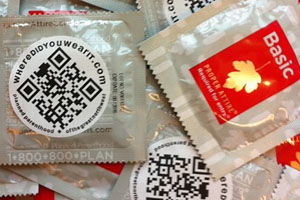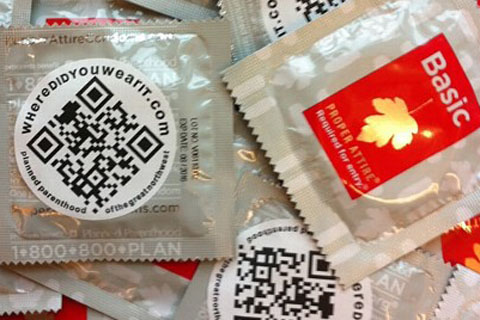 Young people using social media sites such as Facebook, Twitter and the location-based Foursquare are often criticized for posting photos from drunken parties or sharing mundane personal details such as what they ate for breakfast. Now, new geo-tracking condoms are taking the concept of over-sharing to a whole new level, encouraging young people to “check in” wherever they are having sex.
Young people using social media sites such as Facebook, Twitter and the location-based Foursquare are often criticized for posting photos from drunken parties or sharing mundane personal details such as what they ate for breakfast. Now, new geo-tracking condoms are taking the concept of over-sharing to a whole new level, encouraging young people to “check in” wherever they are having sex.
Planned Parenthood of the Great Northwest—serving Alaska, Idaho and western Washington, including Seattle—has been distributing to college students 55,000 condoms with QR codes (small, square barcodes that can be scanned by smartphones). Condom users scan the code, which takes them to a website called “Where Did You Wear It?” that allows them to anonymously post the location of their sexual encounter. The website asks for details such as age, sex and relationship type, and users can even rate how good the experience was.
A map on the website tracks the condom use, and visitors can filter the results to view only check-ins matching certain criteria, such as why the condom was used (for pregnancy-prevention or STD prevention), how good the sex was (good, great or “Ah-maz-ing: rainbows exploded and mountains trembled”) or the relationship status of the couple (married, dating or one-night stand).
The website isn’t just a resource for college students to track all the places they’ve had sex. There are also links to educational resources by Planned Parenthood that encourage safe sex and include information about contraception and proper condom use.
The idea isn’t unique, however. Brazil has had great success encouraging condom use through a similar campaign by DKT International, a non-profit that promotes family planning and HIV/AIDS prevention through social marketing. The website for the company’s Prudence condom brand features a similar location-based social sharing feature, although it’s not anonymous. Check-ins are posted to Facebook and allows other users to comment on the posts.
DKT-Brazil worked closely with the Brazilian government to make condoms more affordable for low-income families. According to its website, in 2011 DKT-Brazil sold 114 million condoms, a 24 percent increase over the previous year.
Photo via Planned Parenthood of the Great Northwest
